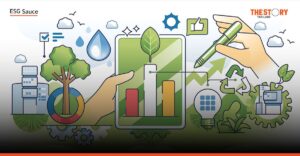NESCAFÉ is reinforcing its commitment to creating a sustainable future for Thailand’s coffee industry, focusing on strengthening the coffee business through inspirational brand and product innovation as well as advancing sustainable coffee farming practices.
Despite a solid growth of Thailand’s coffee market in the first quarter this year and continued rising coffee demand from consumers, the local coffee bean supply is dropping due mainly to climate change and competing crops, increasing the need for imports.
As the market leader, NESCAFÉ will strengthen its business to better serve Thai consumers and drive industry growth, while building climate resilience farming practices to deliver a long-term supply of high-quality local coffee beans.
Thailand’s domestic coffee supply is facing challenges due to climate change and competing crops, resulting in the need to import more coffee beans. Global coffee productions are also on a declining trend. It’s estimated that the global coffee supply could decrease by approximately 50% by 2050, making Regenerative Agriculture efforts more critical than ever.
Jojo Dela Cruz, Business Executive Officer – Coffee and Creamer Business Unit, Nestlé (Thai) Ltd., said, “As the coffee market leader, NESCAFÉ will continue our active role in creating a sustainable future for Thailand’s coffee industry. We are committed to strengthening our NESCAFÉ business to better serve Thai consumers and drive the industry while advancing sustainable coffee farming to ensure a dependable long-term coffee supply for the benefit of our consumers, the farmers we work with as well as our partners and suppliers and this country as a whole.”
Based on the commitment, NESCAFÉ strategy in the second half of this year will focus on three areas, which can be summarized as NES strategy: Repositioning NESCAFÉ as an Inspiring Catalyst, Providing the Ultimate Coffee Experience through Innovation and Renovation, and Putting Sustainability at the Core of the Brand.
NESCAFÉ is advancing sustainable coffee farming through Regenerative Agriculture under the NESCAFÉ Plan 2030, a global sustainability initiative. By promoting regenerative agriculture, NESCAFÉ aims to help coffee farmers handle climate change, improve yields and quality as well as protect and restore natural biodiversity and resources.
“I’m happy to share that, with our efforts to drive regenerative agriculture in coffee farming, NESCAFÉ is now 100% Responsibly Sourced as certified by the globally recognized standard of Common Code for the Coffee Community (4C). This guarantees that our coffee beans are produced in accordance with global sustainability standards so we can ensure a quality cup of coffee for Thai consumers.” added Dela Cruz.
NESCAFÉ is also committed to continuing to support local Thai farmers by purchasing Robusta coffee beans directly from them at a fair price based on the world’s coffee price to improve their livelihoods and ensure reliable market for their supply.
Advancing Sustainable Coffee Farming by Promoting Regenerative Agriculture and Contributing to Thai Farmers
Tatrit Kunasol, Corporate Agricultural Services Manager, Nestlé (Thai) Ltd., said, “Global warming has reduced suitable agricultural areas for planting crops and raising livestock to just one-third of their original size due to soil degradation and changing climate conditions. This has significantly decreased the country’s coffee production.”
In addition to promoting regenerative agriculture, Nestlé has provided farmers with coffee farming knowledge and technical assistance. This includes collaborating with GIZ in Thailand to develop the Farmer Business School curriculum. This initiative encourages coffee farmers to adopt an entrepreneurial mindset for agriculture. Nestlé also supporting the Best Thai Coffee Contest to promote the use of regenerative agriculture practices in coffee farms, develops coffee plantlets suitable for cultivation in Thailand, and has distributed nearly four million high-quality coffee plantlets to Thai farmers.
Sudjai Kamyord, a coffee farmer from Chumphon province, said, “I have been growing coffee for almost 40 years. At times, I felt discouraged by the declining and poor-quality yields, until Nestlé sent agricultural experts to help and provide advice on nearly all aspects of coffee farming, including regenerative agriculture practices, which improved the yields. Without Nestlé’s help, there might not be any more coffee growing in Chumphon. Nowadays, the weather is getting very hot and dry, and water is scarce. If coffee doesn’t get enough water, there is a decrease in production. By following Nestlé’s approach, our farm has been less affected than others. Nestlé has helped improve our quality of life in a sustainable way. I encourage farmers to adopt regenerative agriculture practices to ensure good and sustainable yields.”
“In addition to regenerative agriculture practices, Nestlé also teaches grafting techniques to increase yields by three to four times. The plantlets they give us produce good yields, large beans, and are drought resistant. The company also help us analyze soil conditions for proper fertilization,” he added.
Most recently, Nestlé has promoted beekeeping in coffee farms to aid pollination, which also indicates that no chemicals are used. For example, Sudjai’s coffee farm practices beekeeping to demonstrate biological richness.
APX Logistics Secures Investments from SBI and Announces Expansion Plan










